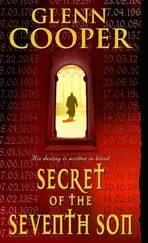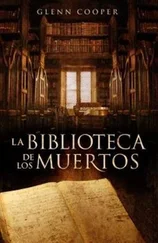Glenn Cooper - Book of Souls
Здесь есть возможность читать онлайн «Glenn Cooper - Book of Souls» весь текст электронной книги совершенно бесплатно (целиком полную версию без сокращений). В некоторых случаях можно слушать аудио, скачать через торрент в формате fb2 и присутствует краткое содержание. Жанр: Триллер, на английском языке. Описание произведения, (предисловие) а так же отзывы посетителей доступны на портале библиотеки ЛибКат.
- Название:Book of Souls
- Автор:
- Жанр:
- Год:неизвестен
- ISBN:нет данных
- Рейтинг книги:5 / 5. Голосов: 1
-
Избранное:Добавить в избранное
- Отзывы:
-
Ваша оценка:
- 100
- 1
- 2
- 3
- 4
- 5
Book of Souls: краткое содержание, описание и аннотация
Предлагаем к чтению аннотацию, описание, краткое содержание или предисловие (зависит от того, что написал сам автор книги «Book of Souls»). Если вы не нашли необходимую информацию о книге — напишите в комментариях, мы постараемся отыскать её.
Book of Souls — читать онлайн бесплатно полную книгу (весь текст) целиком
Ниже представлен текст книги, разбитый по страницам. Система сохранения места последней прочитанной страницы, позволяет с удобством читать онлайн бесплатно книгу «Book of Souls», без необходимости каждый раз заново искать на чём Вы остановились. Поставьте закладку, и сможете в любой момент перейти на страницу, на которой закончили чтение.
Интервал:
Закладка:
After all, Luther proclaimed, Paul had written in Romans that it was God who would save us: “For in the Gospel, a righteousness from God is revealed, a righteousness that is by faith from first to last, just as it is written the righteous shall live by faith.” Surely, Luther argued, men did not need the Pope and priests and all the trappings and finery of the Church for salvation. All they required was a personal relationship with God.
Luther’s Wittenberg thesis was quickly translated from Latin to German and widely published. Devout men had already been quietly grumbling about the decadence of the Church and the abuses of the Papacy. Now, it was as if a match had been tossed on the dry kindling of discontent. The fire that began to burn, the Reformation, was sweeping Europe, and even within a conservative bastion like Montaigu, smoke from the Reformist fires was wafting in. Students with open and brilliant minds, like Jean, were beginning to feel the heat.
Edgar was in his room struggling to memorize the tract of Pope Leo by the light of a small candle. He held the pamphlet with one hand and rubbed the welt on his cheek with the other. He was cold, tired, hungry, and sad. If suffering were a requirement for salvation, then surely he would be saved. This was the only positive thought he could muster. Then a knock startled him.
He opened the door and looked up at the placid face of Jean.
“Good evening, Edgar. I thought I would see how you were doing.”
Edgar sputtered in surprise, then asked Jean to come in. He offered his chair, and said, “Thank you for visiting.”
“I was only down the hall.”
“I know, but it is still unexpected. It is the first time.”
Jean smiled. “We have more in common today than yesterday. We have both been branded by Bedier.”
“Perhaps,” Edgar said glumly, “but yours was for brilliance, mine for stupidity.”
“You are burdened by the language. If I had to conduct myself in English, I would not be so brilliant.”
“You are kind to say that.”
Jean rose. “Well, old Tempete will be patrolling the yard soon, looking for candlelight. We had better to bed. Here.” He handed Edgar a piece of bread secreted in a handkerchief.
Edgar teared up and thanked him profusely. “Please, stay a short while,” he begged. “I would like to ask you something.”
Jean obliged and folded his hands on his lap, a benign and patient gesture. He waited for Edgar to wolf down the bread and finish swallowing.
“I am having great difficulties,” Edgar said. “I am no scholar. I find the curriculum at Montaigu difficult, and I dread each day. Yet I cannot leave, for my father would suffer me worse than the masters.”
“I am sorry for you, Edgar. Your soul is being tested. What can I do?”
“Help me with my studies. Be my tutor.”
Jean shook his head. “I cannot.”
“Why?”
“I do not have the time. There are not the hours in the day, for I am determined to read everything I can on the great issues of our time.”
“The Reformation,” Edgar grunted.
“We are fortunate to live in this exciting era.”
“My family is wealthy,” Edgar said suddenly. “I will find a way to pay you.”
“I have no need for money. I only thirst for knowledge. Now, I must be gone.”
“No!” Edgar said this so forcefully he surprised himself. He had to persuade Jean to help; he was at his wit’s end. He thought quickly-perhaps there was a way. It would violate an oath he had given himself, but what choice did he have? He blurted this out: “If you will help me, I will show you something that will, no doubt, fascinate you and greatly stimulate your mind.”
Jean raised his eyebrows. “You have stirred my interest, Edgar. What do you have?”
“A book. I have a book.”
“What book?”
He had crossed the Rubicon. He fell to the floor, opened his clothes chest, and pulled out his father’s large book. “This one.”
“Let me see!”
Edgar placed it on the desk and let Jean inspect it, watching as the serious young man leafed through the pages with increasing amazement. “The year of our Lord 1527. Yet, most of these dates are in the future, in the months to come. How can this be?”
“I have pondered this since I could first read,” Edgar said. “This book has been in my family for generations, passed from father to son. What was the future has become the present.”
Jean came across a sheath of loose parchments stuck into the pages. “And this? This letter?”
“I have not yet read it! I hastily took the pages from my father’s collection when I left England last month. I have long been told it bears on the matter. I had hoped to have the opportunity to study it in Paris, but I have not had the time or strength to do so. It is no favor to me it is in Latin. My head spins!”
Jean regarded him disapprovingly. “Your father does not know you have these?”
“It is not a theft! I borrowed the book and the letter and intend to return them. I have confessed to myself a minor sin.”
Jean was already reading the first page of the abbot’s letter, breezing through the Latin as if it were his native French. He devoured the first page and was on to the second without uttering a word. Edgar left him to his task, studying his face for a reaction, resisting the urge to plead, “What? What does it say?”
As Jean turned pages, his expression was indecipherable although Edgar felt he was watching an older, wiser man, not a fellow student. He read on without interruption for a full fifteen minutes and when the last page was returned to the bottom of the stack, a page marked with the date 9 February, 2027, he simply said, “Incredible.”
“Tell me, please.”
“You truly have not read this?”
“Truly. I beg you-enlighten me!”
“I fear it is a tale of madness or wicked fancy, Edgar. Your treasure undoubtedly belongs on the fire.”
“You are wrong, sir, I am sure. My father has told me the book is a true prophecy.”
“Let me tell you about the nonsense written by this Abbot Felix, then you can judge yourself. I will be brief because if Tempete catches us up so late, we will surely glimpse the gates of hell.”
Chapter 20
The next morning, Edgar did not feel as cold and miserable as usual. He sprang out of bed warmed by the spirit of excitement and camaraderie. While Jean had remained derisive and skeptical, Edgar completely believed everything that was contained in the abbot’s letter.
Finally, he felt he understood the Cantwell family secret and the significance of his strange book. But perhaps more importantly-for a scared, lonely boy adrift in a foreign city, he now had a friend. Jean was kind and attentive and, above all, not scornful. Edgar was sick of scorn being heaped on him like manure. From his father. His brother. His tutors. This French lad was treating him with dignity, like a fellow human being.
Before he departed for the night, Edgar had beseeched Jean to keep his mind open to the possibility that the letter could be a true and factual account rather than the ravings of a lunatic monk. Edgar proposed a plan he had been harboring for some time, and, to his relief, Jean had not summarily dismissed it.
In the chapel, Edgar made eye contact with Jean across the pew and received the precious gift of another small wink. Throughout the morning, the two boys exchanged furtive glances at prayer, in the classroom and at breakfast until in the early afternoon they were finally permitted to speak to each other privately at the start of one of their infrequent recreation periods.
There were flurries of snow in the air, and a crisp wind blew through the school’s courtyard. “You’d better fetch your cloak,” Jean told him. “But be quick.”
Читать дальшеИнтервал:
Закладка:
Похожие книги на «Book of Souls»
Представляем Вашему вниманию похожие книги на «Book of Souls» списком для выбора. Мы отобрали схожую по названию и смыслу литературу в надежде предоставить читателям больше вариантов отыскать новые, интересные, ещё непрочитанные произведения.
Обсуждение, отзывы о книге «Book of Souls» и просто собственные мнения читателей. Оставьте ваши комментарии, напишите, что Вы думаете о произведении, его смысле или главных героях. Укажите что конкретно понравилось, а что нет, и почему Вы так считаете.












